-
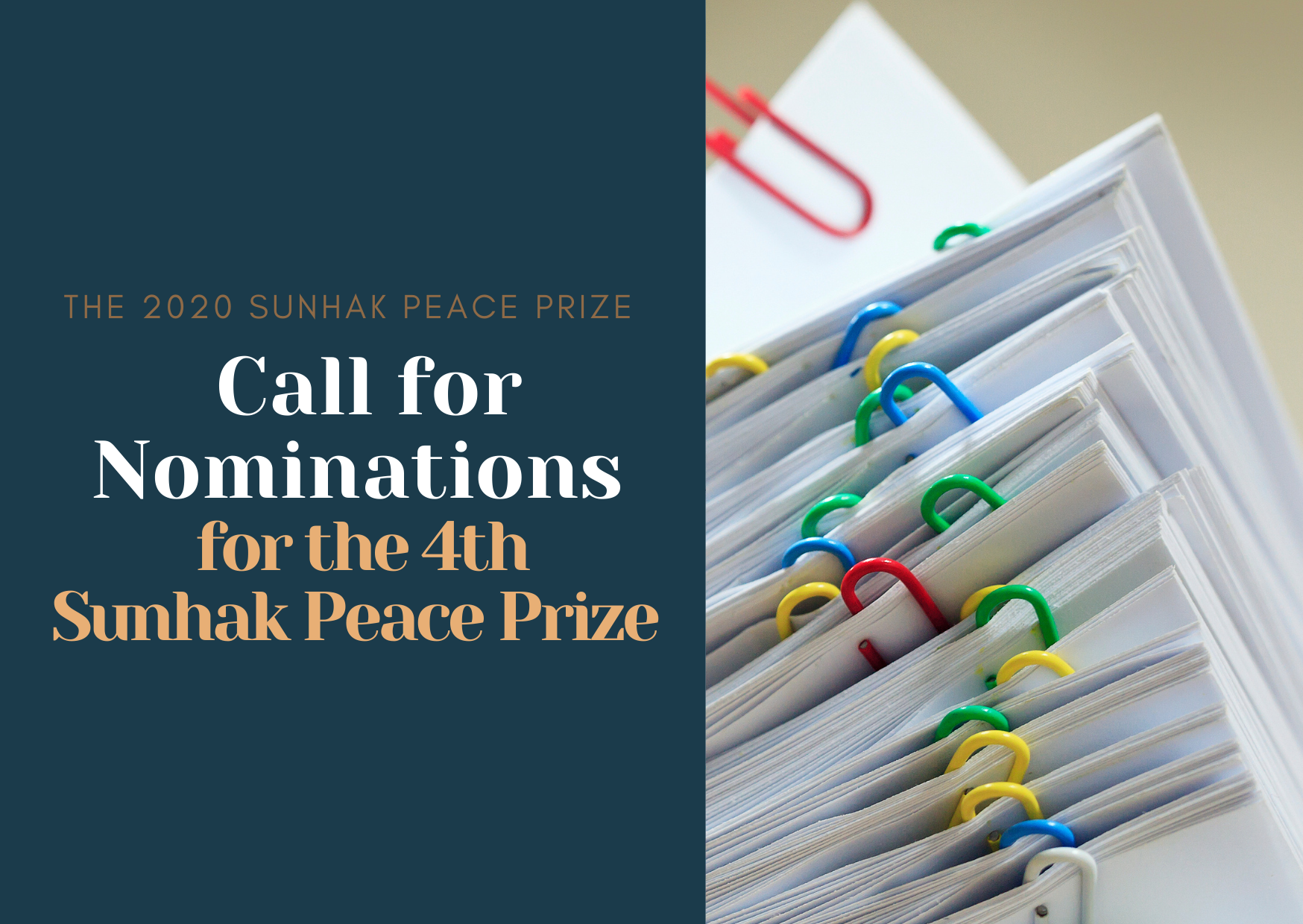
Call for Nominations for the 4th Sunhak Peace Prize
Call for Nominations for the 4th Sunhak Peace Prize Submission Period: March to May 2019 The Sunhak Peace Prize Committee is accepting nominations for the 4th Sunhak Peace Prize from March through May 2019. The Sunhak Peace Prize awards distinguished individuals or organizations that have contributed significantly to peace and the welfare of future generations throughout the world. The Sunhak Peace Prize emphasizes three core areas in its evaluation of candidates: Sustainable Human Development, Conflict Resolution, and Ecological Conservation. Sunhak Peace Prize laureates are selected biannually by an international committee, and receive an award in the amount of one million dollars. Dr. Hak Ja Han Moon founded the Sunhak Peace Prize to continue the legacy and vision of Rev. Dr. Sun Myung Moon who founded the Family Federation for World Peace and Unification, and who dedicated his life to the promotion of world peace, seeking to build a world where in all humanity lives together in harmony as one family under God. The inaugural award was given in 2015. The 4th Sunhak Peace Prize Award Ceremony will take place in 2020, to honor the centenary of the birth of the founder, Rev. Dr. Sun Myung Moon.Eligibility for the award is as follows: ▲ Individual or organization that has contributed to the areas of sustainable development, conflict resolution, or ecological conservation ▲ Individual or organization that has positively improved the lives of people from diverse nations, races, religions and cultures for the sake of peace Nominators are to prepare the candidate nomination form and supporting material, detailing the candidate’s achievements, and submit to the Sunhak Peace Prize Secretariat by May 31. The Sunhak Peace Prize Committee will decide on the final Sunhak Peace Prize Laureate(s) in October 2019, and announce the Laureate(s) soon thereafter. The Award Ceremony will be held in February 2020, in South Korea. The candidate nomination form can be downloaded from the Sunhak Peace Prize website (sunhakpeaceprize.org). Further questions can be directed to the Sunhak Peace Prize Secretariat. The first Sunhak Peace Prize in 2015 was awarded to Mr. Anote Tong, former President of Kiribati, who raised international awareness of the serious risk posed by climate change, and Dr. Modadugu Vijay Gupta, who increased the productivity of fisheries through development of aquaculture methods. The second Sunhak Peace Prize in 2017, which focused on the global refugee crisis, was awarded to Italian surgeon Dr. Gino Strada, who provided medical care free of charge to 8 million refugees and victims of war, and Dr. Sakina Yacoobi, who educated over 1300 Afghanistan refugees. The third Sunhak Peace Prize in 2019 focused on peace and development in Africa. The laureates were Dr. Adesina, President of the African Development Bank, and Waris Dirie, founder of Desert Flower Foundation. Sunhak Peace Price Committee SecretariatAddress: 8F Dowon Bldg. 34 Mapo-daero, Mapo-gu, Seoul, Korea 04174E-mail: sunhakpeaceprize@gmail.comTEL: +82-2-3278-5158, FAX: +82-02-3278-5198
-
- 2,518
-
- 2 March 2021
-
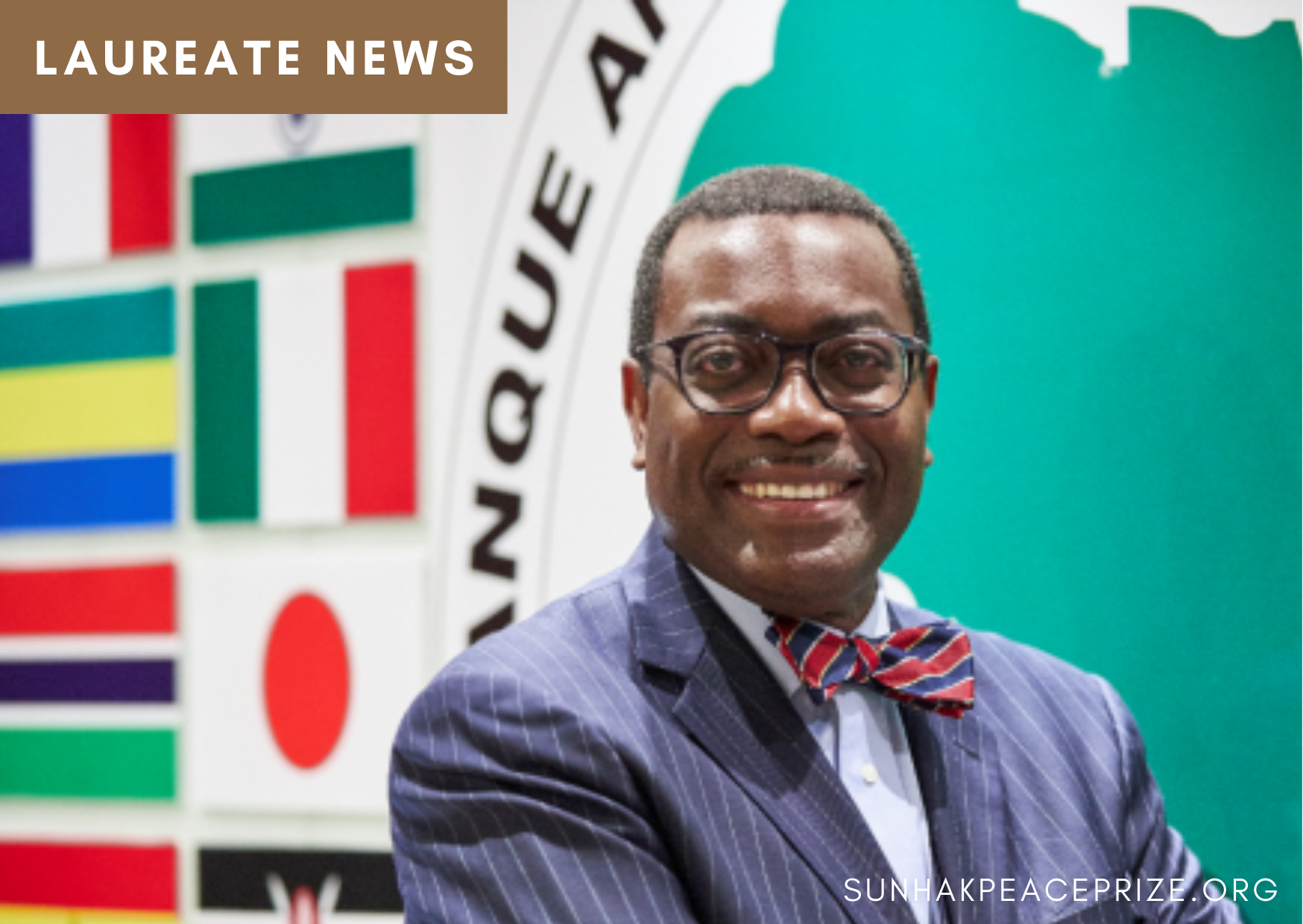
Dr. Akinwumi Adesina, Donates Cash Prizes of$500,000 to the World Fighters Foundation
2019 Sunhak Peace Prize Laureate, Dr. Akinwumi Adesina,Donates Cash Prize of $500,000 to the World Fighters Foundation • Awarded 2019 Sunhak Peace Prize for his contribution in leading Africa’s agricultural innovation and promoting good governance in Africa.• Calling out to international community that, “There cannot be peace in a world that is hungry.”• Will put his best effort in the eradication of famine and hunger and complete employment of youths in Africa. ▲Dr. Akinwumi A. Adesina, the President of African Development BankThe president of the African Development Bank and the 2019 Laureate for the Sunhak Peace Prize, Dr. Akinwumi Adesina, declared to donate his cash Award Prize of $500,000 to the World Fighters Foundation. On February 9, 2019, at the 2019 Sunhak Peace Prize Award Ceremony, Dr. Akinwumi Adesina stated that, “I am fully dedicating the whole of the $500,000 cash award of the Sunhak Peace Prize to my Foundation, the World Hunger Fighters Foundation, to carry on the Lord\'s request to provide \"daily bread\" for everyone around our world.”During his Acceptance Speech, Dr. Adesina proclaimed to the international communities that, “There cannot be peace in a world that is hungry. Over 850 million people are hungry, with over 150 million children malnourished. While progress is being made, we are not winning the war on global hunger.” In addition, he asserted the importance of food security stating that, “Nothing is more important than ensuring that we feed the world and eliminate hunger and malnutrition. Hunger is an indictment on the human race. Any economy that claims growth without feeding its people is a failed economy. Nobody has to go hungry, white, black, pink, orange or any color you can think.”At the peak of his speech, he humbly shared his vision saying that, “For my life is only useful to the extent to which it helps to lift millions out of poverty. The Sunhak Peace Prize is a call to do more for our world - and I will.” Dr. Adesina strongly proclaimed that he is going to put all of his efforts in ending famine, poverty and low employment of youths in Africa.The Sunhak Peace Prize was established based upon the vision of “One Family Under God,” promoted by the founders, Rev. Sun Myung Moon and Dr. Hak Ja Han Moon, to bring peaceful future for humanity. The Sunhak Peace Prize honors individuals and organizations who have made significant contributions to the peace and the human development of the future generations. The Sunhak Peace Prize includes a cash prize totaling of one million dollars.The Laureates of the 2019 Sunhak Peace Prize awarded Dr. Akinwumi Adesina (59) and world-recognized human rights activist in the fight against female genital mutilation, Ms. Waris Dirie (54).The 2019 Sunhak Peace Prize Award Ceremony was attended by over 1,000 participants, including 10 current and former heads of state and many others representing government, medias, academia, economy and religions.
-
- 2,690
-
- 2 March 2021
-
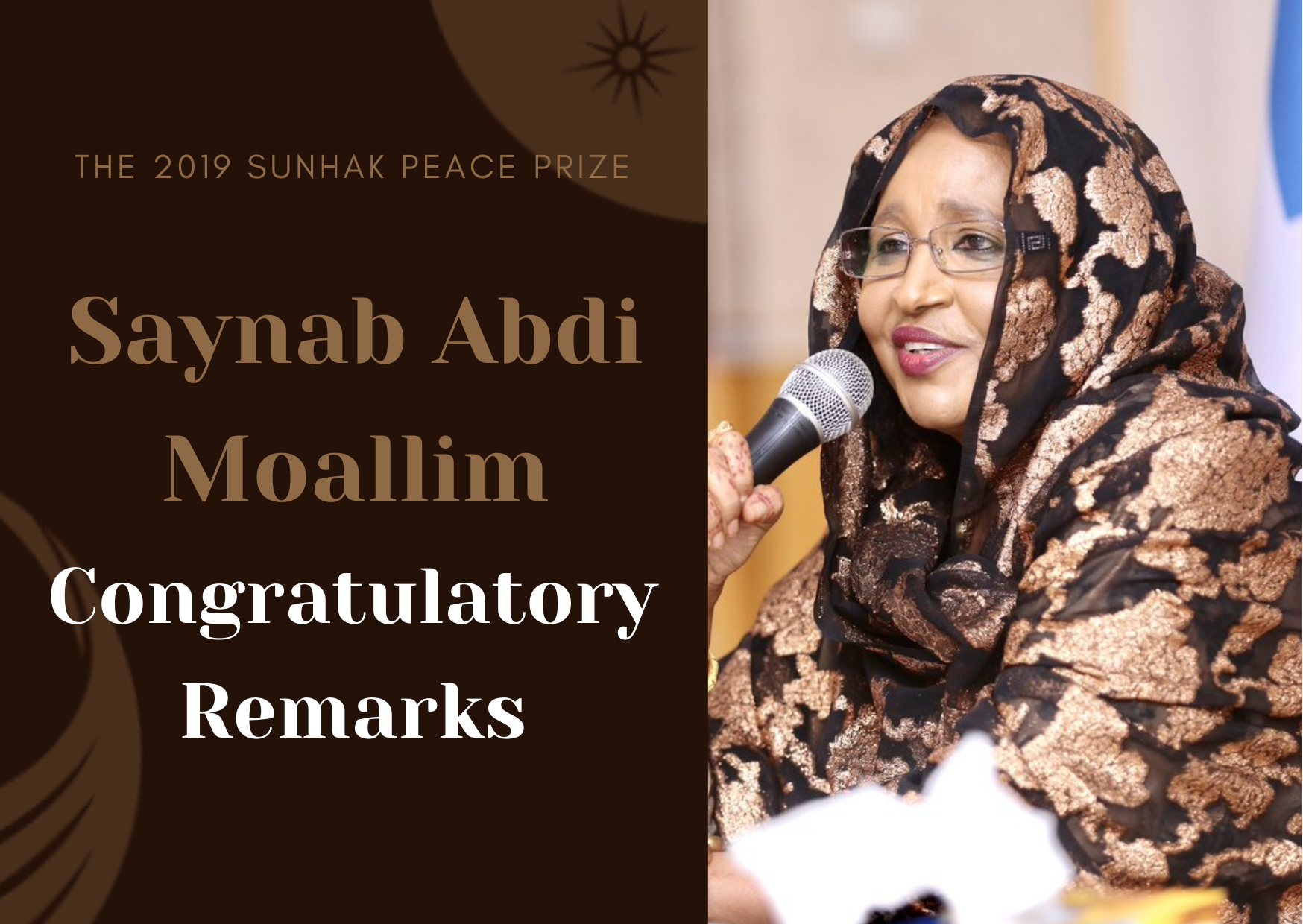
2019 Laureate Award Ceremony Congratulatory Remarks - H.E. Saynab Abdi Moallim
2019 Sunhak Peace Prize Laureate Award Ceremony Congratulatory RemarksBy H.E. MoallimDear Excellencies, Distinguished Guests, Ladies and Gentlemen,I am honored to give congratulatory remarks on this stage of prestigious Sunhak Peace Prize. The Award Theme of the 2019 Sunhak Peace Prize, “Human Rights and Human Development in Africa,” really touches my heart sincerely, because I am a citizen of the 21st century and because I am an African. A prize cannot be awarded to everyone. A prize is something that is awarded to an individual with great devotion and one who has God-given ability. Therefore, I would like to send great applause and appreciation to the Laureates of the 2019 Sunhak Peace Prize, Dr. Akinwumi Adesina and Ms. Waris Dirie, who have devoted their lives in building better world for all. Waris Dirie is a human rights activist who have been fighting endlessly to eradicate female genital mutilation around the world. Especially, she has contributed greatly to raising worldwide awareness of female genital mutilation issue, after when she was appointed as the UN special ambassador for the elimination of female genital mutilation in 1997. After when she published a book called Desert Flower, the book became world’s best-selling book and it was adopted into a movie. The movie helped to spread the tragic facts about female genital mutilation and helped people to change their perspectives about female genital mutilation. For over thousands of years, the cruel act has been practiced in many countries. And fighting against this deep-rooted tradition was surely unimaginably painful path to take with many threats against Waris Dirie. However, Waris Dirie devoted her life to improve lives of girls and women, at the risk of her life. In the end, she has improved millions of girls and women’s human rights by saving many of them from female genital mutilation. Now, the number of victims of Female genital mutilation is decreasing greatly, through her tireless efforts.The two nominees of the Sunhak Peace Prize for 2019, are the great man and woman of this century, who have taken the path which no one else has chosen to take, for the happiness of humanity and for the betterment of our future. And, they have endured the hardships and have been making tremendous achievements through their tireless efforts. They emphasize on the value of loving humanity to pave a bright future for everyone. Again, I would like to give sincere congratulations to Dr. Akinwumi Adesina and Ms. Waris Dirie.Lastly I would like to send sincere thanks and congratulations to the Sunhak Peace Prize Foundation on awarding individuals and organizations with futuristic perspective in gathering hopes and lights to building bright future for humanity. I think awarding of a prize is the greatest and glorious way to uplift the humanistic spirit. Also, it’s not only the reward given to the nominee, but it’s an opportunity for everyone to celebrate, congratulate and to learn the nominee’s marvelous achievements in building world of peace altogether.Thank you very much. February 9, 2019
-
- 2,385
-
- 2 March 2021
-
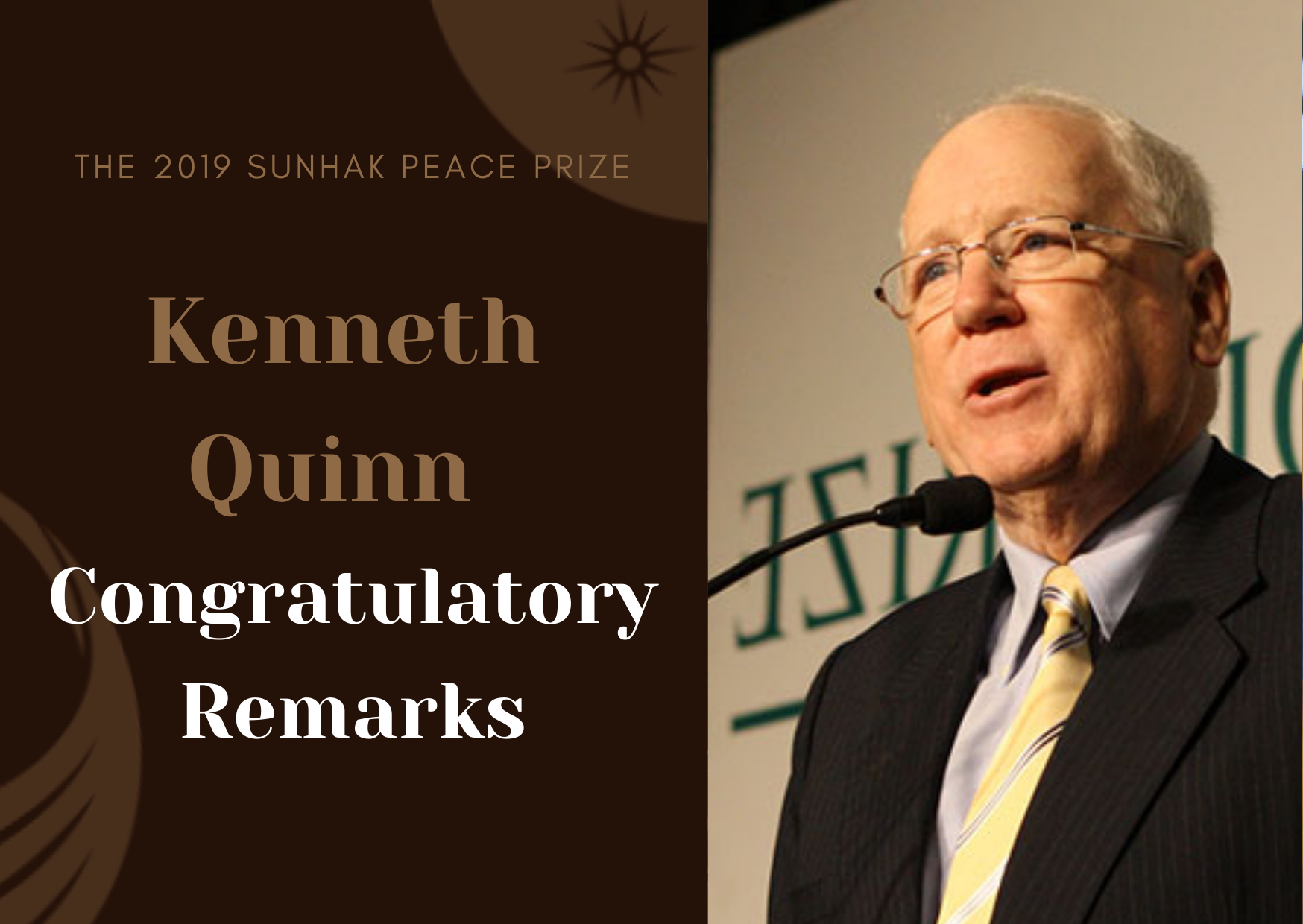
2019 Laureate Award Ceremony Congratulatory Remarks - Ambassador Kenneth Quinn
The 2019 Sunhak Peace Prize Laureate Congratulatory Messageby Ambassador Kenneth M. Quinn, President,The World Food Prize Foundationat the Sunhak Peace Prize Award CeremonySeoul, Korea February 9, 2019I extend my heartfelt congratulations to Ms. Waris Dirie for her truly remarkable leadership on behalf of the human rights of young girls and Dr. Adesina for his great in developing Africa into a land of prosperity and promoting good governance in Africa and their selection as a 2019 SuhHak Prize recipient. Together with Dr. Adesina these two Laureates truly will bring a distinct focus on uplifting Human Rights and Human Development in Africa and thereby advance the Sunhak Peace Agenda for the Future. As the second decade of the 21st Century draws to a close, it is clear that the single greatest challenge that the human species has ever confronted is this: can we nutritiously and sustainably feed the 9 to 10 billion people who will be on Earth by the year 2050, especially given the increasingly adverse impact of climate volatility; a second inextricably linked existential issue is whether global peace and stability, so integral to meeting that overriding global food security goal, can be maintained. Essential to fulfilling both of these challenges is whether the human dignity of all, particularly the poorest and most malnourished, among them the women and children, can be preserved and elevated. In my capacity as President of the World Food Prize, I have traveled over 12,000 miles from our headquarters in Des Moines, Iowa in the American heartland, to be here to proclaim that, given these overriding global challenges, there could be no more fitting choice than the selection of Dr. Akinwumi Ayodeji Adesina, son of Nigeria, the 2017 World Food Prize Laureate and President of the African Development Bank, to be the 2019 Sunhak Peace Prize Laureate.On behalf of our World Food Prize Council of Advisors, I commend Dr. Il Sik Hong and the Sunhak Peace Prize Committee for its selection of Dr. Adesina for this extraordinary high honor and this extraordinarily well-deserved global recognition. More than any other individual, Dr. Akinwumi Adesina embodies the personal attributes, substantive knowledge and a several decade long array of impressive achievements that have already uplifted the lives of millions of people in his native Nigeria and indeed across the African continent. Through this exceptional leadership, President Adesina has demonstrated the path that must be followed if the world is to remain at peace and meet and overcome the unprecedented humanitarian and ecological challenges we face. The selection of Dr. Adesina, our 2017 World Food Prize Laureate, for this extraordinary honor as a Sunhak Laureate not only recognizes his multiple and diverse achievements, but also provides a 50 year-long historic linkage to the first con-joining of the issues of peace and confronting hunger through agricultural advances. In 1970, Dr. Norman E. Borlaug, a native of my home state of Iowa, received the Nobel Peace Prize for developing miracle wheat, which saved millions and millions across South Asia from famine starvation and death. Dr. Borlaug, lauded as the Father of the Green Revolution, founded the World Food Prize in 1986 to inspire those breakthrough achievements that would be needed to eradicate hunger and malnutrition as world population inexorably expanded. That same year, Dr. Borlaug became a personal mentor to a young economist from Nigeria who had just graduated from Purdue University with a Ph.D. In Agricultural Economics and was starting a position at the Rockefeller Foundation. For the next several decades, with Borlaug ‘s encouragement, Akinwumi Adesina, supported by his wonderful wife Grace, embarked on his odyssey to transform Africa, as an agricultural scientist at the Rockefeller Foundation, just as Borlaug had spread the Green Revolution through Asia, the Middle East and Latin America. Ladies and gentlemen, the challenge of feeding 9 to 10 billion people will ultimately be decided in those areas with between one and two billion people: In China, in India, in Latin America centered around Brazil, and in Africa. Success will be determined by investment in science and research, enhanced nutrition, expanded rural infrastructure especially roads and policies that unleash innovation and increase crop yields, all designed to uplift small holder farmers. Above all, peace will be a critical element of success.Of all the regions, Africa with its broad array of geographic sub-divisions and multiple political leaders, offers the most difficult challenge of harmonizing all these diverse factors. It will be there in Africa that the greatest challenge in all human history will ultimately be decided. Can a peaceful Africa feed itself?Last November sitting in the audience of over 1,000 potential investors at the African Investment Conference he organized, I listened as President Akinwumi Adesina mesmerized the attendees, imbuing them with the sense of “Yes, Africa Can.” There engulfed by the legacy of Nobel Peace Prize Laureate Nelson Mandela, the man who transformed South African agriculture and brought peace to that country, to guide him, my friend Akin Adesina was extolling the vision of how all of African agriculture can be transformed by Africans themselves and thereby bring peace to the continent. It filled me and everyone who was standing to cheer him, with hope and optimism about Africa’s future.As a World Food Prize Laureate and now a SuhHak Peace Laureate, Dr. Akinwumi Adesina has an even higher platform from which to confront this ultimate challenge and bring Africa a Green Revolution. I know that Dr. Norman Borlaug is looking down this day with a large smile on his face for all you have done, My Friend, and for all you will continue to do. Congratulations!
-
- 2,269
-
- 2 March 2021
-
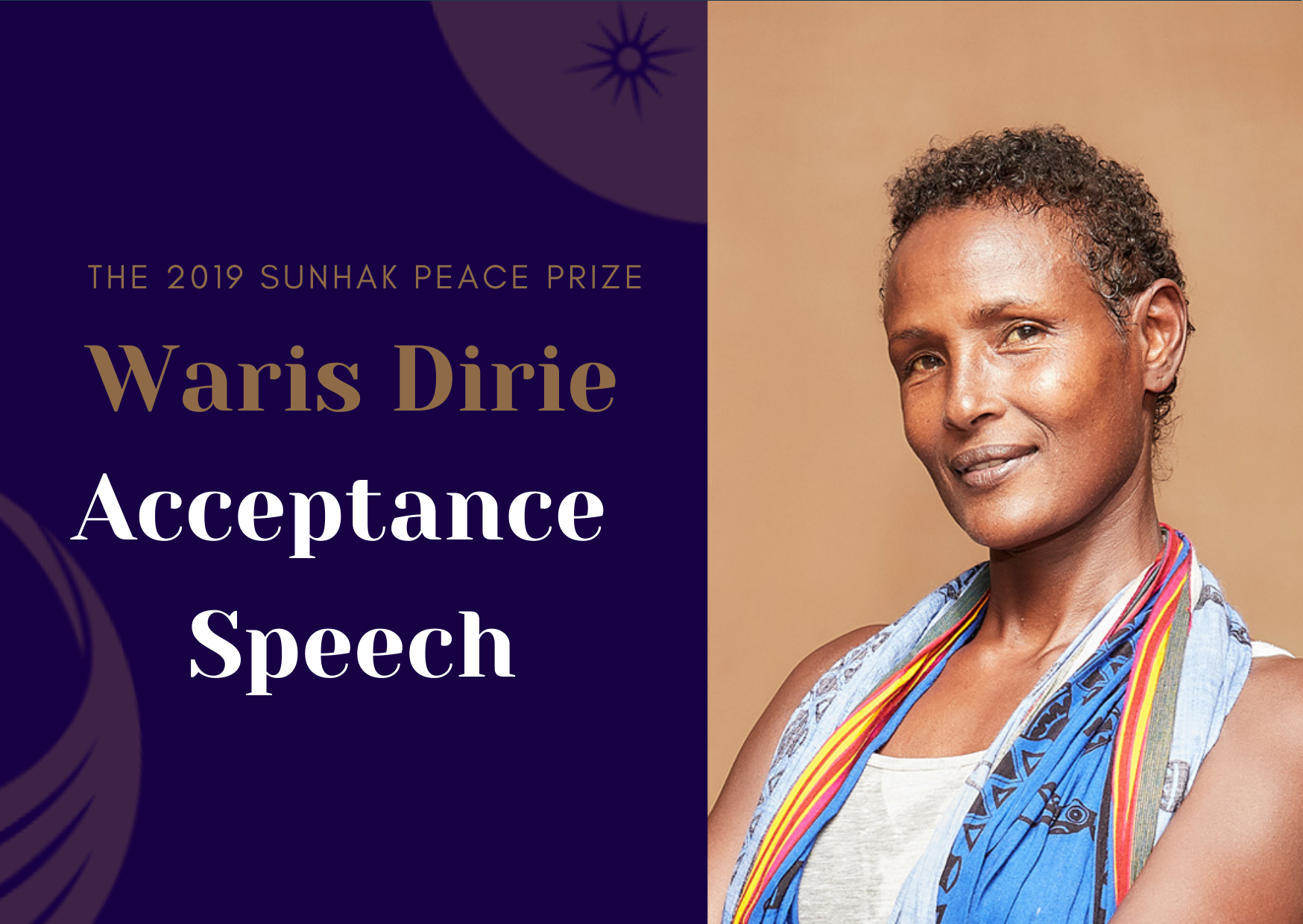
2019 Sunhak Peace Prize Laureate's Acceptance Speech - Ms. Waris Dirie
Acceptance Speech of the Sunhak Peace Prize by WARIS DIRIELadies and GentlemenIt is an honour for me to receive the Sunhak Peace Prize.I wish to thank Rev. Sun Myung Moon and Dr. Hak Ja Han Moon for devoting their lives to achieving universal peace and promoting the fundamental values of peace, dialogue and cooperation in the name of the human family.I\'m from Somalia, a country where one of the longest and bloodiest civil wars of our time is still going on since 1991.Somalia, a country plagued by drought and famine. Somalia, a country with one of the highest birth rates and one that has the highest child and mother mortality rates in the world.Somalia, a country where only one out of three citizens has learned how to read and write.Somalia, a country where women are neither thanked nor respected, and where 98% of women are suffered, and are still suffering, under the inhumane torture of Female Genital Mutilation.Many years ago, I left Somalia because I did not want to be married as a 13-year-old girl to a man who could have been my grandfather.I had to leave my beloved mother, my family and the desert, from which I have learned so much. It was a goodbye forever. I could not and did not want to live in a society where women do not have any rights. I did not want to live in a society where it was ok to beat up women, to rape them, to sell them and to send a woman away once you have enough of her. I left my home being absolutely determined that one day I will fight against all this injustice and that I will fight for the rights of girls and women. In England, where my journey took me for a few years, I taught myself how to read and write. As a girl, I have never had the chance to visit school in Somalia. To become financially independent, I worked during the day as a cleaning lady and studied in the nights. One day in London, by coincidence, I was discovered as a model by Terence Donovan, the Buckingham Palace photographer, in a fast food restaurant, while I was scrubbing the floor.The dream of so many girls came true for me. Soon my face graced the covers of big fashion- and women’s magazines. The worldwide most famous fashion and beauty brands booked me for their campaigns. I was travelling around the world, saw the most beautiful places, experienced wealth and glamour, lived in New York and London, and even acted in a James Bond movie. But I never forgot about my roots and my humanitarian mission.I have seen and experienced inconceivable violence. As a child, I almost died after the cruel torture of female genital mutilation.I asked myself why people engage each other in such cruel ways.It cannot be the will of a good God, that we humiliate each other, kill and torture each other.We are the ones making this world a living hell for others, and even for ourselves. And I have asked myself – why? Do we love each other too little? Do we love ourselves too little? Do we respect each other too little? Do we respect ourselves too little? Are those the reasons why all this cruel and evil is happening?When and where do we learn love and respect?First with our mothers. Mothers have a big responsibility. Because all their love and care, which we receive as children, shape us - forever.Mothers and, of course, fathers teach us how to respect ourselves and above all to respect others and Mother Earth.And here, in parenting, it is where peace begins in ourselves and hence the peaceful coexistence with others. If we, as parents, neglect our children, do not love them and forget to teach them to respect, we put peace at risk. After that, it is the job of our education system to teach peace, to not only demand respect from our students, but also to treat them with love and respect. When our global community reaches this goal, a very big step towards peace is done.I know that it is possible and I know we can do it together. For me, John Lennon\'s composition \"Imagine\" is the greatest peace-song ever written.“Imagine all the people living life in peace! You may say I am a dreamer, but I am not the only one.I hope one day you will join us and the world will live as one ” is sung by one of the greatest artists and peace activists of all times and I have taken this words to heart. Dear John, no you are not alone, many people share your dream. All they want is world peace - peace between us and nations and peoples and religions .Peace in our homes and in our hearts.In remembrance of you, great John Lennon, and all those people, dreaming every day of a world in peace, like you did, contributing to this mission, I accept with lots of love and respect the Sunhak Peace Prize 2019. Love and Peace to the world! Waris Dirie
-
- 2,451
-
- 2 March 2021
-
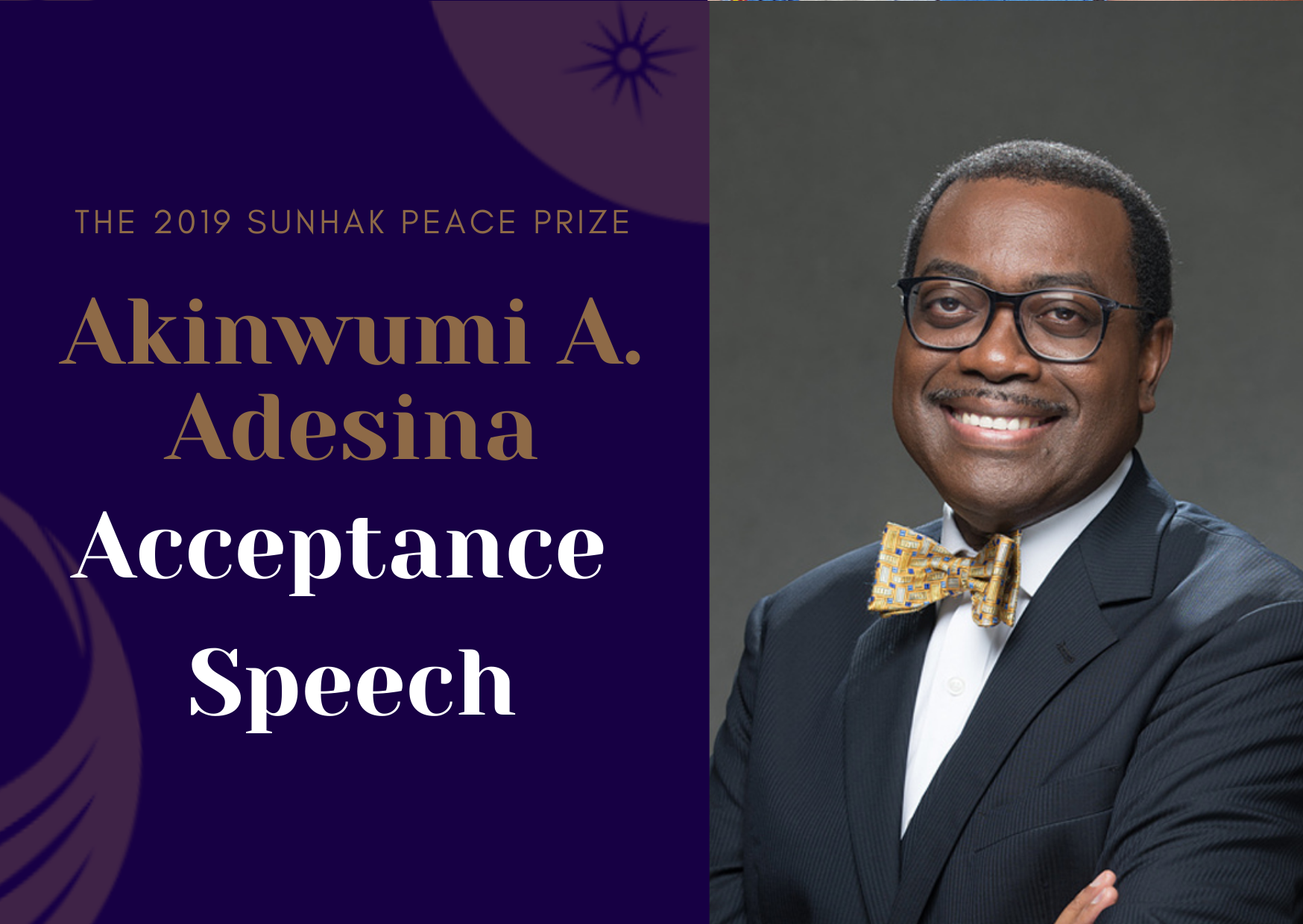
2019 Sunhak Peace Prize Laureate's Acceptance Speech - Dr. Akinwumi Adesina
Acceptance Speech of the Sunhak Peace Prize by Dr. Akinwumi A. Adesina, President, African Development Bank, in Seoul, South Korea, February 9, 2019Your Excellencies, the Founder of the Sunhak Peace Prize, Dr. Mrs. Hak Ja Han Moon, Chairman and members of the Sunhak Peace Prize Foundation, distinguished guests, friends, ladies and gentlemen.Good morning everyone! I am delighted to be here today. It is such a great honor to have been awarded the Sunhak Peace Prize. I would like to heartily congratulate my co-Laureate, Waris Dirie, and commend her for her global fight against female genital mutilation. This Prize is not about me. No one should ever work to win a Prize. I serve God and humanity. For my life is only useful to the extent to which it helps to lift millions out of poverty. But when one\'s effort is recognized, then one is very humbled: so thank you so much to the Chairman and Committee of the Sunhak Peace Prize Foundation, and the nominators around the world, for this great honour bestowed on me. The Sunhak Peace Prize is a call to do more for our world - and I will. I wish to commend the founder Dr. Mrs. Hak Ja Han Moon for setting up the Sunhak Peace Prize to recognize work to make the world a better place. The ideals that you stand for, a world where we live in peace, with one another, is not only the decent thing to do; it is a moral imperative. And your launching the Sunhak Peace Prize shows the power of family bonds. I would like to recognize, as I always do, my dear wife of 35 years, Grace. She is not here tonight but I am sure she is watching this live telecast at home. Grace has been my pillar of support, strength and success. Without her I would not be here tonight. I love you and appreciate you more today, than when you agreed to marry a young man who did not have much more to offer other than his love, affection, commitment and dreams. For believing in me and us, thank you! The human race is one family, regardless of nationality, religion, race or color. We all have the same blood running through our bodies. We are all citizens of the world. When one suffers everyone does!There is tremendous suffering going on in the world. Over 850 million people are hungry, with over 150 million children malnourished. While progress is being made, we are not winning the war on global hunger. There cannot be peace in a world that is hungry. Hunger persists in regions and places going through conflicts, wars and fragility. Those who suffer the most are women and children. When the ego and pride of the mighty clash, the consequences are felt by the weakest among us: children. They do not create wars but the world\'s children suffer from it the most. The pictures of walking skeletons breaks our hearts, eyes so hollow, with hearts beatings from skeletal stomachs which seems to say \"mama why am I not getting food?\". But their mamas are also not getting food. God made the stomachs to be filled not to go empty. Today the budgets spent on the military far exceeds what we are putting up to improve agriculture and feed ourselves. The world cannot plow with guns; and beans and rice seeds are needed more than bullets. Seeds give life. Bullets end life. In the 700s, a Bible prophet by the name of Isaiah urged that the world should turn its swords into plows and spears into pruning forks and that they learn to cease from war. Wars build nothing. To secure our world we must end the endless desire to look for reasons for conflict. Let\'s instead find reasons to increase support for millions of the poor to feed our world. For a peaceful world will be a food secure world. There must be accountability to the poor. And we must reduce global income inequality. Think about it only 1% of the rich in the world own almost 50% of global wealth. The poor are stuck only to end up eating crumbs, if any at all, that fall from the tables of the rich. We need wealth, yes, but we need wealth for everyone not just a few. The sense of exclusion and lack of equity or fairness often drives conflicts. But nothing drives poverty more than corruption. Corruption is like a blazing fire, it destroys everything in its path. Children cannot go to school or attend poor schools. Hundreds of millions go hungry every day. People living without insurance, who at the first illness spend their entire livelihoods just to survive, if ever they can. The hope of the future, the youth, waste on our streets. Millions go without health insurance. Those who hoped they would make it in the cities end up in the world\'s growing urban sprawl and slums, their future drowned. Yet resources meant for them are lost to the rising tide of corruption. There is a compelling need for public accountability for the people, especially for the poor whose only hope is for governments to help them unlock possibilities for a better future, for them and their children.I remember my time as Minister of Agriculture in Nigeria when I had to fight corruption. We succeeded in ending 40 years of corruption in the fertilizer and seed sector, using a simple tool: mobile phones, to deliver electronic vouchers directly to farmers. This allowed them to buy seeds and fertilizers themselves from the private sector suppliers. We cut off the middlemen; the rent seekers, who for decades have gotten fat on Government contracts, while the poor were drained. We ended Government direct distribution of seeds and fertilizers. It was tough, but it worked. Within four years the system reached over 15 million farmers. One of the farmers, a woman, told me, holding up her phone to show me she\'s received her electronic vouchers: \"now we can live with pride\". This electronic wallet system for farmers is now going global and now, at the African Development Bank, we are helping to expand it across several African countries.The poor do not need handouts, they need accountable governments. The UN estimates that corruption costs $3 trillion per year globally, in terms of bribes and stolen monies. Just think of what that can do. The World Economic Forum estimates that it\'ll take $116 billion per year to feed the world and end hunger. It\'ll take $8.5 billion per year to eliminate malaria. Now, that\'s only 0.28% of what\'s lost to corruption globally every year. It\'ll take $26 billion per year to send all kids in the world to school. The International Atomic Agency estimates that $31 billion per year will provide energy for all in the world. That\'s just 1% of what\'s lost annually to corruption globally. Corruption does not invest in the future, it kills the future. That\'s why the African Development Bank is working hard, with governments, to improve transparency, governance and accountability across the continent. We are improving the transparency in the delivery and implementation of our projects. Indeed, last year the global report on \"Publish What You Fund\" rated the African Development Bank as the 4th most transparent institution in the world. We are working hard to build a brighter future for the continent. At the African Development Bank we are investing $24 billion under a bold \"Feed Africa\" initiative to help the continent achieve food security within ten years. We are already reaching millions of farmers with our goal to reach over 35 million farmers. To light up and power Africa and provide universal access to electricity, the African Development Bank is investing $12 billion with goal of leveraging $45-50 billion, over five years. A lot of progress is being made and in the past five years we\'ve provided electricity to over 25 million people.Yet, there\'s still so much to do to make the world a better place for all. That\'s why this Sunhak Peace Prize is a great inspiration for me. It is a call to do more for those least privileged around the world and especially in Africa. Nothing is more important than ensuring that we feed the world and eliminate hunger and malnutrition. Hunger is an indictment on the human race. Any economy that claims growth without feeding its people is a failed economy. Nobody has to go hungry, white, black, pink, orange or any colour you can think. There must be political accountability for hunger around the world. A well fed and healthy population will work harder and be productive. Lower price for food will expand disposable incomes, allowing households to save and invest in the education and health of their children. Healthy populations will live longer raising long term savings pool. And most of all, well fed children will learn well, for an empty stomach dulls the brain. That\'s why the best infrastructure we should build is \"grey matter infrastructure\", simply put the \"brain infrastructure\". And nutritious food is the oil for the brain. So, let\'s turn our swords into plows and our spears into pruning forks. Let\'s turn our guns into seed planters, and replace bullets with seeds to grow our food. Let\'s end the indignity of hunger in our world, for God wants it so. For even when Jesus was asked by his disciples to teach them how to pray, his first request was \"give us this day our daily bread\". That means Food First! That\'s why I am fully dedicating the whole of the $500,000 cash award of the Sunhak Peace Prize to my Foundation, the World Hunger Fighters Foundation, to carry on the Lord\'s request to provide \"daily bread\" for everyone around our world. Thank you all very much and God bless you all.
-
- 2,151
-
- 2 March 2021
-
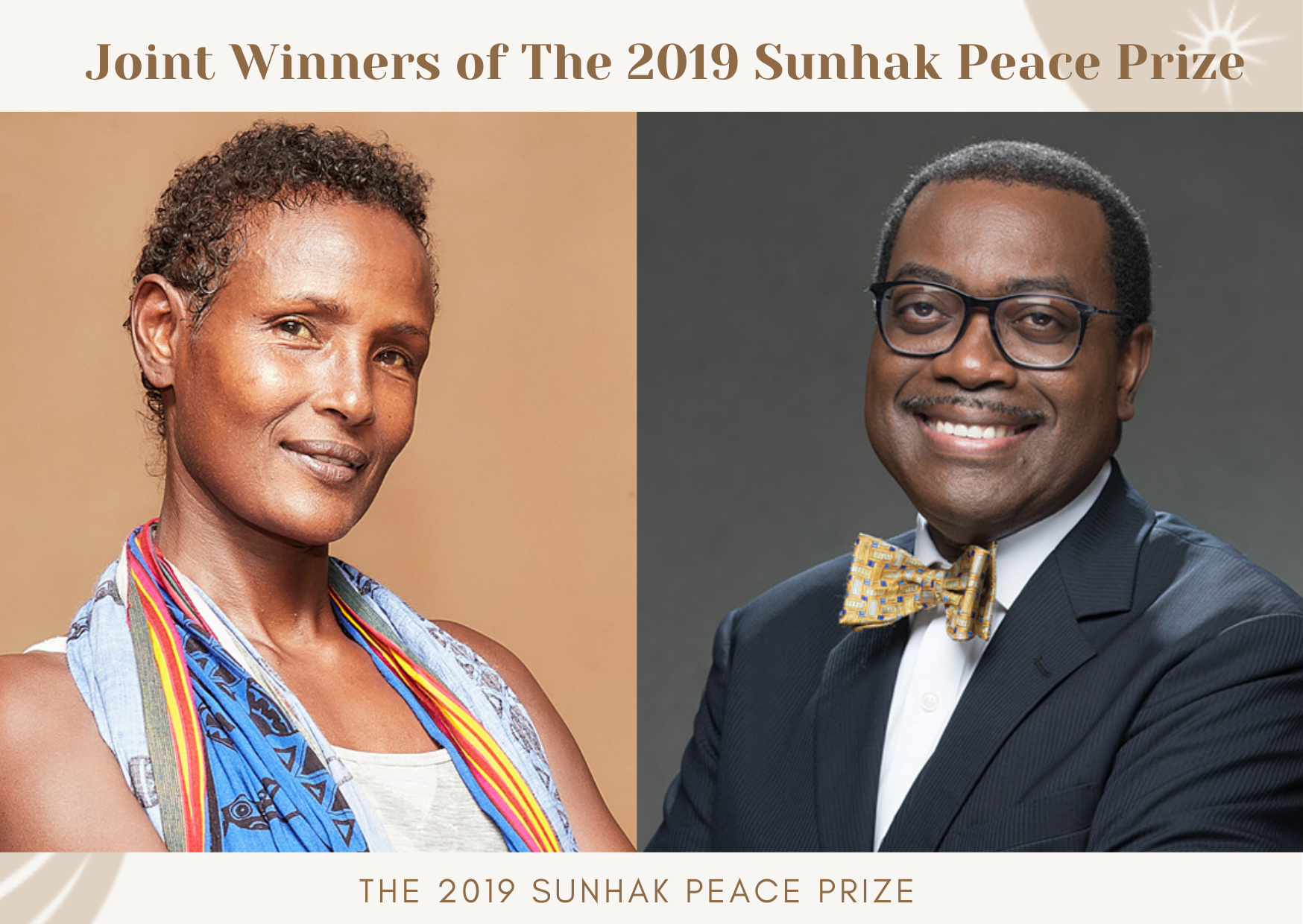
Press Release_2019 Sunhak Peace Prize Award Ceremony
The Sunhak Peace Prize for 2019Convened in Seoul, South KoreaAwarding Akinwumi Ayodeji Adesina& Waris DirieThe Sunhak Peace Prize Committee held the 2019 Sunhak Peace Prize Award Ceremony on February 9 (Saturday) at 10 am, at the Jamsil Lotte Hotel World, Crystal Ballroom.The Sunhak Peace Prize for 2019 was awarded to Dr. Akinwumi Ayodeji Adesina (58), President of the African Development Bank Group and to Waris Dirie (53), human rights pioneer in the fight against female genital mutilation (FGM). The Sunhak Peace Prize Committee announced its Laureates at a press conference held in Cape Town, South Africa, on November 22, 2011, at the Cape Town International Convention Center.The Sunhak Committee acknowledges Dr. Akinwumi Adesina’s achievements in improving Africa’s economy by promoting Good Governance and in leading agricultural innovation for over 30 years. His achievements contributed greatly to food security in Africa, aimed at improving the lives of millions currently living in poverty in Africa.At the Award Ceremony, each laureate received a prize of $500,000, along with a medal and a plaque, presented by the founder, Dr. Hak Ja Han Moon, and Committee Chair Dr. Il Sik Hong.The award ceremony was attended by more than 1,000 delegates, including current and former presidents and vice presidents, leaders and entrepreneurs from Africa, among others representing various governments, academia, businesses, media, and religions.Ambassador Kenneth M. Quinn, president of the World Food Prize Foundation, gave Congratulatory Address stating, “The two Laureates truly will bring a distinct focus on uplifting Human Rights and Human Development in Africa and thereby advance the Sunhak Peace Agenda for the Future.” Also, he emphasized, “As the second decade of the 21st Century draws to a close, it is clear that the single greatest challenge that the human species has ever confronted is that whether humanity can nutritiously and sustainably feed the 9 to 10 billion people who will be on Earth by the year 2050” and he upheld Dr. Adesina’s achievements by adding “Akinwumi Adesina was extolling the vision of how all of African agriculture can be transformed by Africans themselves and thereby bring peace to the continent.”Through his acceptance speech, Dr. Adesina asserted that, “There cannot be peace in a world that is hungry. Awarding of the Sunhak Peace Prize is a call to do more for those least privileged around the world and especially in Africa. In addition, nothing is more important than ensuring that we feed the world and eliminate hunger and malnutrition.” Waris Dirie asserted the Female Genital Mutilation must be eradiated in our time and she will continue to fight for girls and women’s rights until we build a society where their rights can be respected.Chairman of the Sunhak Peace Prize Committee, Dr. Il Sik Hong, stated that “the Sunhak Peace Prize was established based upon the vision of “One Family Under God,” and the 2019 Sunhak Peace Prize gives special attention to “human rights and human development in Africa.”Chairman Hong stated in his Welcome Address that peace can be achieved only when everyone’s human rights are protected and respected. He added that, “By observing the paths of dedication and devotion shown in the lives of this year’s laureates, we can all consider the practices that will work for the betterment of our future. Such conscientious introspection will bring about good deeds, which will build up one by one and open a new chapter of world peace, prologue to a new history.”Meanwhile, the performance was arranged under the theme of “Proceeding Forward to the Bright Future of Africa” overcoming the global refugee crisis with respect and love for humanity.” The performers, including Sohyun Kim and Joon-ho Son, the Korean traditional arts group Little Angels and Expression Crew, created a fantastic harmony that highlighted the mood of the award ceremony.The Sunhak Peace Prize honors individuals and organizations who have made significant contributions to the peace and the human development of the future generations. The Sunhak Peace Prize includes a cash prize totaling of one million dollars.The two laureates are scheduled to have media interviews and events affiliated to their professional fields. They will also attend the World Summit 2019, to give keynote speeches at the special session prepared for the Laureates.February 9, 2019
-
- 2,051
-
- 2 March 2021
-
![[Press Release] The Sunhak Peace Prize for 2019 Convened in Seoul, South Korea Awarding Akinwumi Ade 썸네일](http://sunhakpeaceprize.org/data/bbsData/16297802759.png)
[Press Release] The Sunhak Peace Prize for 2019 Convened in Seoul, South Korea Awarding Akinwumi Ade
The Sunhak Peace Prize for 2019Convened in Seoul, South KoreaAwarding Akinwumi Ayodeji Adesina& Waris DirieThe Sunhak Peace Prize Committee held the 2019 Sunhak Peace Prize Award Ceremony on February 9 (Saturday) at 10 am, at the Jamsil Lotte Hotel World, Crystal Ballroom.The Sunhak Peace Prize for 2019 was awarded to Dr. Akinwumi Ayodeji Adesina (58), President of the African Development Bank Group and to Waris Dirie (53), human rights pioneer in the fight against female genital mutilation (FGM). The Sunhak Peace Prize Committee announced its Laureates at a press conference held in Cape Town, South Africa, on November 22, 2011, at the Cape Town International Convention Center.The Sunhak Committee acknowledges Dr. Akinwumi Adesina’s achievements in improving Africa’s economy by promoting Good Governance and in leading agricultural innovation for over 30 years. His achievements contributed greatly to food security in Africa, aimed at improving the lives of millions currently living in poverty in Africa.At the Award Ceremony, each laureate received a prize of $500,000, along with a medal and a plaque, presented by the founder, Dr. Hak Ja Han Moon, and Committee Chair Dr. Il Sik Hong.The award ceremony was attended by more than 1,000 delegates, including current and former presidents and vice presidents, leaders and entrepreneurs from Africa, among others representing various governments, academia, businesses, media, and religions.Ambassador Kenneth M. Quinn, president of the World Food Prize Foundation, gave Congratulatory Address stating, “The two Laureates truly will bring a distinct focus on uplifting Human Rights and Human Development in Africa and thereby advance the Sunhak Peace Agenda for the Future.” Also, he emphasized, “As the second decade of the 21st Century draws to a close, it is clear that the single greatest challenge that the human species has ever confronted is that whether humanity can nutritiously and sustainably feed the 9 to 10 billion people who will be on Earth by the year 2050” and he upheld Dr. Adesina’s achievements by adding “Akinwumi Adesina was extolling the vision of how all of African agriculture can be transformed by Africans themselves and thereby bring peace to the continent.”Through his acceptance speech, Dr. Adesina asserted that, “There cannot be peace in a world that is hungry. Awarding of the Sunhak Peace Prize is a call to do more for those least privileged around the world and especially in Africa. In addition, nothing is more important than ensuring that we feed the world and eliminate hunger and malnutrition.”Waris Dirie asserted the Female Genital Mutilation must be eradicated in our time and she will continue to fight for girls and women’s rights until we build a society where their rights can be respected.Chairman of the Sunhak Peace Prize Committee, Dr. Il Sik Hong, stated that “the Sunhak Peace Prize was established based upon the vision of “One Family Under God,” and the 2019 Sunhak Peace Prize gives special attention to “human rights and human development in Africa.”Chairman Hong stated in his Welcome Address that peace can be achieved only when everyone’s human rights are protected and respected. He added that, “By observing the paths of dedication and devotion shown in the lives of this year’s laureates, we can all consider the practices that will work for the betterment of our future. Such conscientious introspection will bring about good deeds, which will build up one by one and open a new chapter of world peace, prologue to a new history.”Meanwhile, the performance was arranged under the theme of “Proceeding Forward to the Bright Future of Africa” overcoming the global refugee crisis with respect and love for humanity.” The performers, including Sohyun Kim and Joon-ho Son, the Korean traditional arts group Little Angels and Expression Crew, created a fantastic harmony that highlighted the mood of the award ceremony.The Sunhak Peace Prize honors individuals and organizations who have made significant contributions to the peace and the human development of the future generations. The Sunhak Peace Prize includes a cash prize totaling of one million dollars.The two laureates are scheduled to have media interviews and events affiliated to their professional fields. They will also attend the World Summit 2019, to give keynote speeches at the special session prepared for the Laureates.February 9, 2019
-
- 2,166
-
- 2 March 2021
-
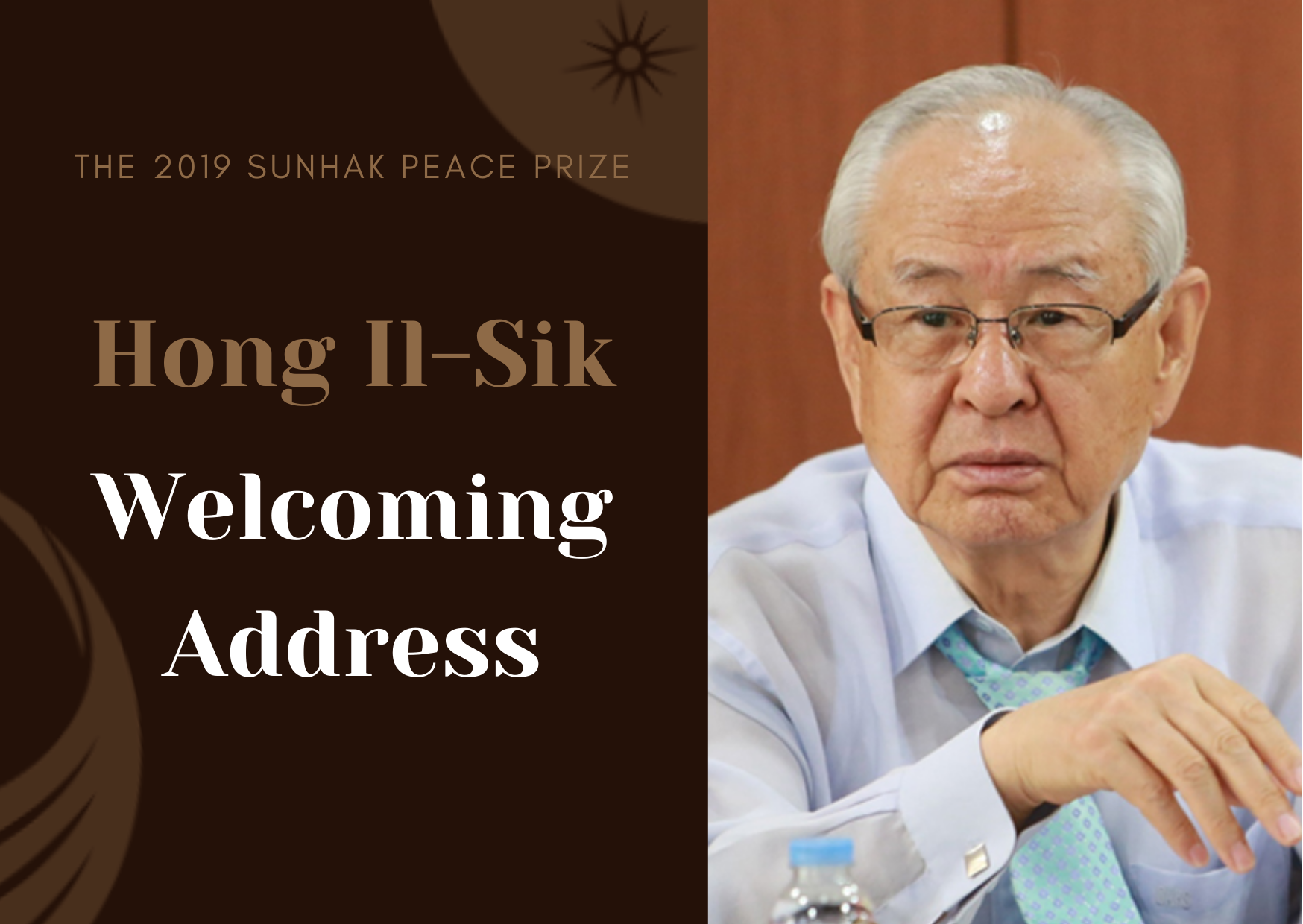
2019 Sunhak Peace Prize Chairman Hong's Welcome Address
Welcome AddressDear Excellencies, Distinguished Guests, Ladies and Gentlemen,It is a great pleasure for me to welcome all of you who have come to this Award Ceremony to congratulate and encourage the laureates of the Sunhak Peace Prize for 2019. In particular, the presence of distinguished leaders and representatives from around the world, including current and former heads of state and special guests from Africa, brings great value to this program.First of all, I would like to express my sincere admiration to the two laureates of the 2019 Sunhak Peace Prize. I congratulate them for their tremendous achievements in devoting their lives for a world of peace for all humanity.To honor the legacy of the late Reverend Dr. Sun Myung Moon, Dr. Hak Ja Han Moon established the Sunhak Peace Prize as an extension of his work for peace. Reverend and Mrs. Moon have dedicated their lives to building a global community based on their vision of “One Family Under God,” which emphasizes interdependence, mutual prosperity and universal values. Especially after Reverend Moon’s ascension in 2012, Mrs. Moon has been actively expanding this work with the purpose of creating a peaceful future of Africa.Excellencies, Distinguished Guests, Ladies and Gentlemen,The 2019 Sunhak Peace Prize has as its theme “Peace and Human Development in Africa.” When we reflect upon peace and human development, putting down the weapons of war is only one step toward building world peace. Peace can be achieved only when everyone’s human rights are protected and respected.The two winners of the Sunhak Peace Prize, Dr. Akinwumi Adesina and Ms. Waris Dirie, have devoted their lives to protecting the world’s most vulnerable people.Dr. Akinwumi Adesina has promoted a vision of good governance for African nations. He has implemented innovative agricultural policies all across Africa, dedicated to a future filled with hope.Waris Dirie has improved the rights of millions of girls and women by leading a campaign to eradicate tragic act of female genital mutilation.By observing the paths of dedication and devotion shown in the lives of this year’s laureates, we can see how courage and leadership can steer the world’s communities one step closer to peace and prosperity.When we reflect on where we are standing at this moment, we understand that we are already heading toward the middle of the 21st century. Therefore, I want to encourage everyone to constantly consider practices that will work for the betterment of our future. Such conscientious introspection will bring about good deeds, which will build up one by one and open a new chapter of world peace, prologue to a new history.The Sunhak Peace Prize will continuously seek out brave men and women who love humanity and work to build world peace based upon the vision of “One Family Under God” and “Making the World Better for Future Generations.”Finally, I want to express my sincere appreciation to all the distinguished guests. I send you my best wishes and ask that peace live in your families. Thank you.February 9, 2019Il Sik HongChairman, Sunhak Peace Prize Committee
-
- 2,023
-
- 2 March 2021
-
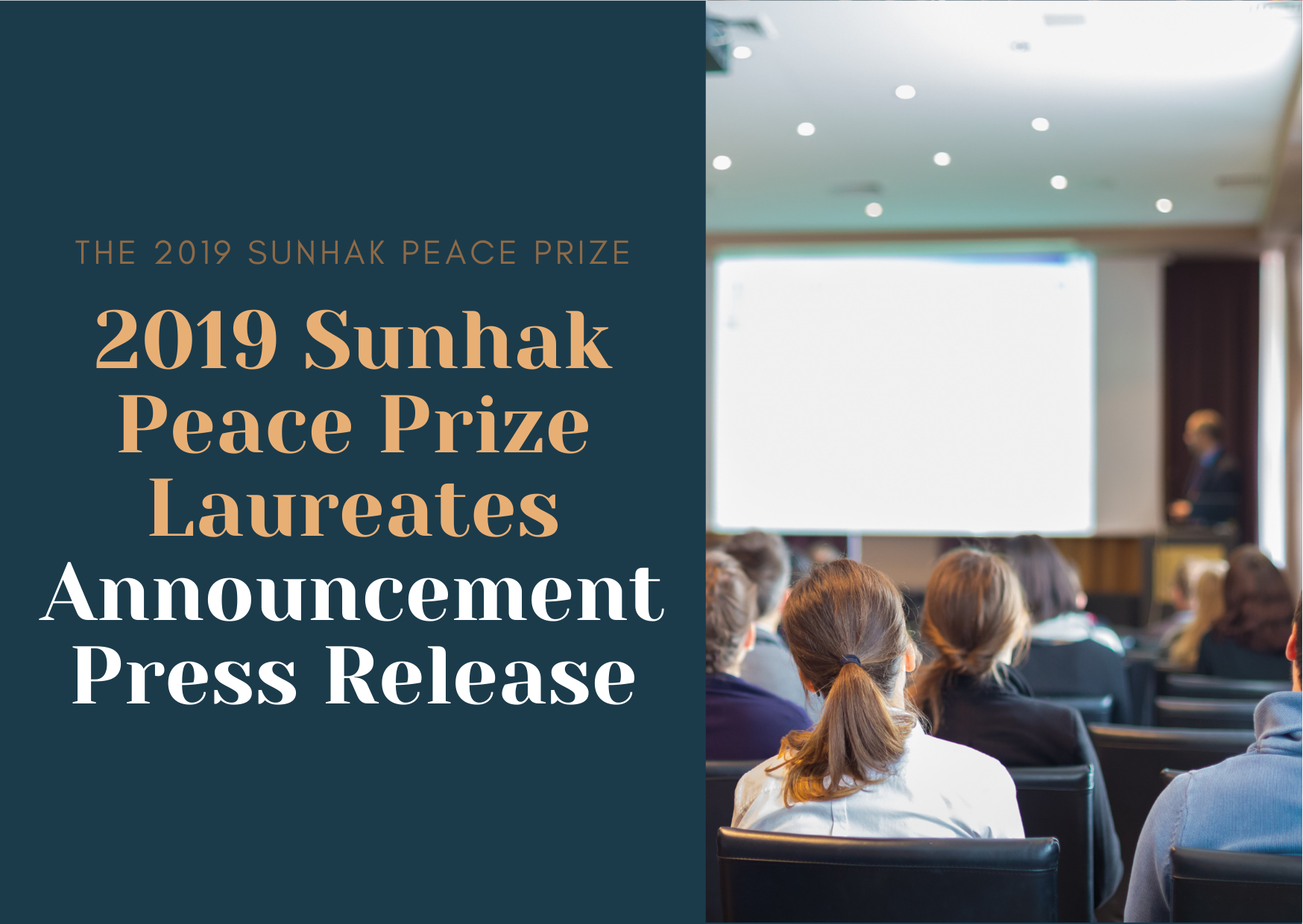
The 2019 Sunhak Peace Prize Awarded to Waris Dirie and Dr. Akinwumi Ayodeji Adesina
Press Release for the 2019 Sunhak Peace Prize Please Find Attachments for More Information About the LaureatesLaureate Announcement made in Cape Town, South Africa, on Thursday November 22nd 2018, at 5:00 PM at the Cape Town International Convention Center.Waris Dirie: human rights activist and super-model, recognized throughout the world for her work to eliminate the practice of FGM (Female Genital Mutilation).Akinwumi A. Adesina: President of the African Development Bank, committed to the eradication of poverty through agricultural innovation, and promoting Good Governance through the works of developing Africa’s economy.At the Cape Town International Convention Center, the Sunhak Peace Prize Committee announced that the 2019 Laureates for the Sunhak Peace Prize would be Waris Dirie, 53 year-old world-class supermodel and anti-FGM activist, and Dr. Akinwumi Ayodeji Adesina, 58 year-old president of the African Development Bank Group.Waris Dirie is widely acclaimed for raising awareness throughout the world, about the tragic practice which is still prevalent in some parts of the world, Female Genital Mutilation (FGM). The Sunhak Peace Prize Committee selected Waris Dirie in recognition of her tireless advocacy for the rights of girls and women, and her call for a worldwide resolution calling for the eradication of FGM, thereby protecting girls who are at the risk of FGM.As an agricultural economist, Dr. Akinwumi Adesina has been a leader in agricultural innovation for over 30 years. He has contributed greatly to food security in Africa, aimed at improving the lives of millions currently living in poverty, throughout the African continent. The Sunhak Committee acknowledges Dr. Akinwumi Adesina’s achievements in promoting Good Governance through the works of improving Africa’s economies and lifting millions of rural and poor farmers out of poverty.The Sunhak Peace Prize Committee stated, that “both laureates have made a significant contribution to improving the quality of life of the most vulnerable in Africa.”The Sunhak Peace Prize Committee recognizes the immense importance of Africa, observes that Africa is undergoing rapid change and development, while also facing challenges. These Laureates have made dramatic contributions to Africa’s growth and development.Warisi Dirie was born into a goat-herding nomad family in Somalia. She was subjected to female circumcision at the age of 5. In 1997, when her fashion career was at its peak, as a world-class supermodel, she shared her experience with the world. She became a voice for the voiceless. Her story shocked and at the same time enlightened people around the world about the tragic reality of FGM.This brave start led her to become a human rights activist to end the barbaric practice that are thriving in Africa. She was then appointed as a first Special Ambassador to the United Nations for the Elimination of Female Genital Mutilation in 1997. Since then, she has been putting tireless efforts in anti-FGM Campaign, upholding the rights of women and girls.As a result of her efforts, 15 African Union member countries ratified the “Maputo Protocol” in 2003, which lists FGM as a harmful practice that must be ended. In 2012, the United Nations General Assembly unanimously passed a resolution banning the practice of FGM, and the UN has set a goal to eliminate FGM by 2030. This innovative milestone saved the lives of millions of girls who were at the risk the violent practice.According to the World Health Organization (WHO), over 200 million girls and women have been affected by FGM, which is prevalent in more than 30 countries, including parts of Africa and the Middle East. Moreover, the practice threatens the lives of millions of girls. Also, due to the increase of the immigration rates, countries in Europe, the USA and Asia are affected by FGM practices. This barbaric practice is a crime and against humanity, which often causes infertility, problems with urination, high blood loss, infections and in some cases even death.In 2013, Waris Dirie’s Desert Flower Foundation partnered with Waldfriede hospital and started the first Desert Flower Center to provide a comprehensive cure for victims of FGM. In 2014, Desert Flower Center started Training Center to provide FGM reconstructive surgery education to doctors and obstetricians, these centers provide reconstructive surgeries for the victims of FGM. In addition, she is at the forefront in helping victims of FGM improve their lives through “basic literacy education” and “career education.” Recently, she opened an elementary school in Sierra Leone, and launched companies in Ethiopia and Kenya to provide employment to thousands.Dr. Akinwumi Adesina has been a leader in agricultural innovation in Africa for over 30 years, bringing significant improvements to Africa’s food security. His leadership is building stepping-stones for Africa’s dynamic growth.Dr. Akinwumi Adesina pioneered major transformations in the agricultural field, including expanding rice production by introducing high yielding technologies, designing and implementing policies to support farmers’ access to technologies at scale, increasing the availability of credit for millions of smallholder farmers, attracting private investments for the agricultural sector, rooting out the corrupt elements in the fertilizer industry, and assisting in establishment of major agricultural policies for Africa’s green revolution.The “Africa Fertilizer Summit,” which he organized in 2006, was one of the largest high-level meetings in history that had a focus on solving Africa’s food issues. During this Summit, Dr. Adesina was instrumental in developing the “Abuja Declaration on Fertilizer for the African Green Revolution,” whereby the participants stated their commitment to the “eradication of hunger in Africa, by 2030.”Dr. Adesina worked with various banks and international NGOs in order to create an innovative financing system, providing loans to smallholder farmers, providing a way for them to rise out of poverty. This move leveraged $100 million in loans and provided opportunities for smallholder farmers to increase their agricultural productivity, and their income.Dr. Akinwumi Adesina currently serves as the president of the African Development Bank Group which plays a central role in Africa’s development. As an “economic commander” of Africa, he promotes the “High 5 Strategy” that include: light up and power Africa, feed Africa, industrialize Africa, integrate Africa and improve the quality of life for the people of Africa. As a result of his work, the lives of millions of people throughout Africa have been improved.Chairman of the Sunhak Peace Prize Committee, Dr. Il Sik Hong, stated that “the Sunhak Peace Prize was established based upon the vision of ‘One Family Under God.’ The 2019 Sunhak Peace Prize gives special attention to peace and human development in Africa.”Dr. Hong added “in order for us to build an era of peace and coexistence in the 21st century, we want to encourage continuous development in Africa. Africa is a rising star and its growth will contribute to global progress and development throughout the 21st century.”The Sunhak Peace Prize honors individuals and organizations who have made significant contributions to the peace and the welfare of the future generations. The Sunhak Peace Prize includes a cash prize totaling one million dollars. The 2019 Sunhak Peace Prize Award Ceremony will take place in February, 2019 in Seoul, Korea.
-
- 2,276
-
- 2 March 2021
-
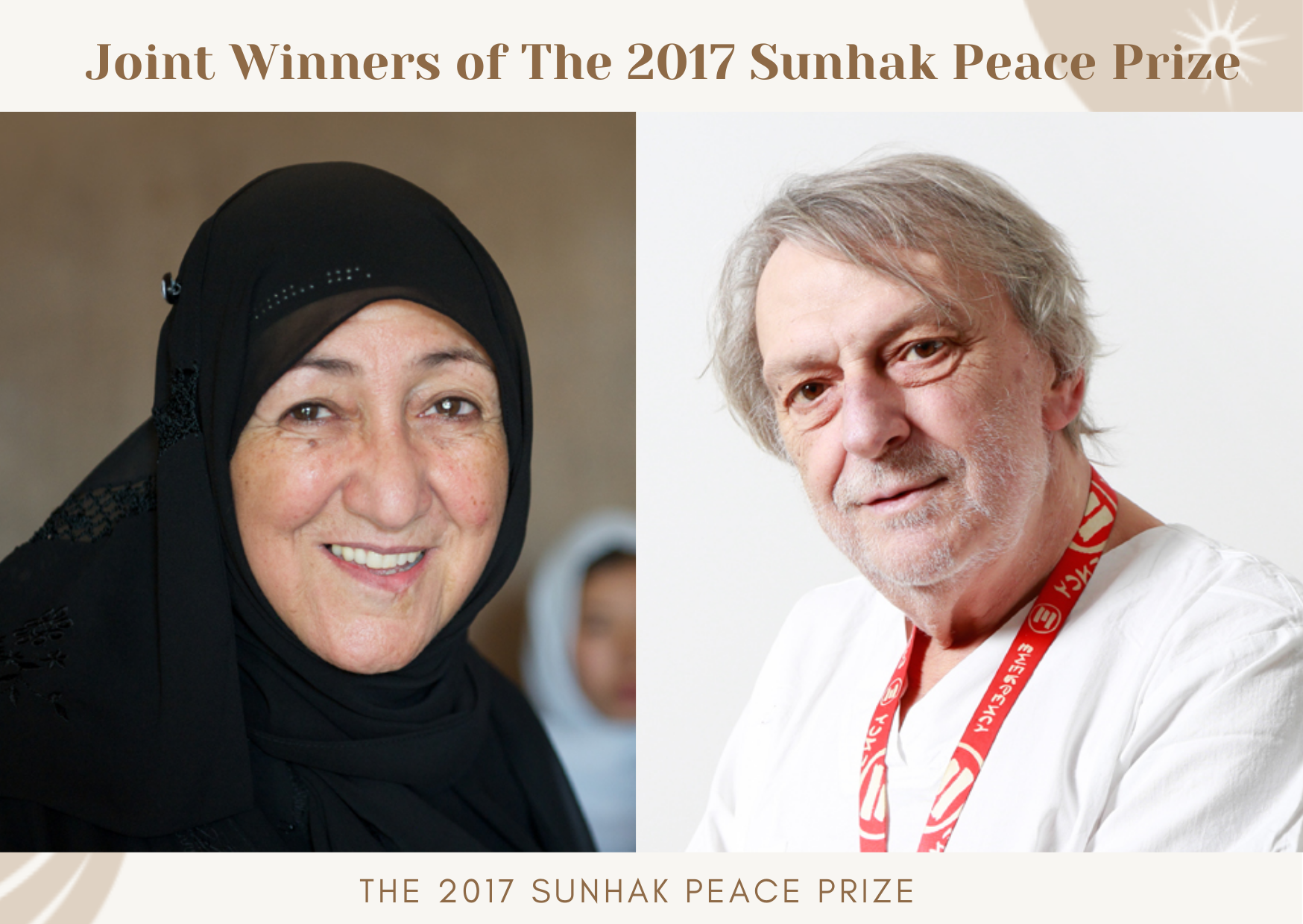
The 2017 Sunhak Peace Prize Award Ceremony
Gino Strada (Italian Surgeon), Sakena Yacoobi (Afghan Women\'s Educator) To Be Jointly Awarded● Being held on February 3 (Friday) at 10 am, at the Jamsil, Lotte Hotel World, Crystal Ballroom● Over 800 people from more than 100 countries around the world in attendance, including current and former parliamentarians, national and international VIPs, music choreographer Kolleen Park, among others from all walks of life● The “laureate lecture” will be held at a special plenary session later that day on February 3 (Friday) 5:30 pm at the same venue The Sunhak Peace Prize Committee (Chairman, Dr. Il Sik Hong, former president of Korea University) will hold its “2017 Sunhak Peace Prize Award Ceremony” on February 3 (Friday), at 10 am at the Jamsil, Lotte Hotel World, Crystal Ballroom (3rd floor).Dr. Gino Strada, an Italian surgeon, and Dr. Sakena Yacoobi, an Afghan women’s education professor, were selected as co-recipients of the prize. On November 29, 2016, the Committee officially announced its laureates to the world at a press conference in Washington, DC. Dr. Gino Strada is highly regarded for his humanitarianism transcending national borders, saving the lives of eight million people over the past 28 years, providing \"urgent medical relief\" to refugees and war victims at the forefront of global disputes. Dr. Sakena Yacoobi has been greatly recognized for her efforts to \"educate\" 13 million refugees at Afghan refugee camps devastated by the war, and offer a solution for their resettlement.Each laureate will receive a prize of $500,000, to go along with a medal and plaque presented by the founder, Dr. Hak Ja Han Moon, and Committee Chair, Dr. Il Sik Hong, during the award ceremony. The Congratulatory Address will be given by former President of Kiribati, and the laureate of the inaugural Sunhak Peace Prize, HE Anote Tong.More than 800 delegates are expected to attend the award ceremony, including current and former presidents and vice presidents, among others representing various governments, academia, businesses, media, and religions.During its laureate announcement press conference, Committee Chairman Dr. Il Sik Hong, former president of Korea University stated, “As a prize founded on the vision for peace of building “One Family Under God,” the Committee presents the refugee crisis as its core theme for the 2017 awards.”Chairman Hong further asserted that, “At a time when the global refugee crisis seems to be worsening by the day, these two laureates, who have devoted their lives to fundamentally rebuilding the lives of refugees through providing the most essential of our rights to ‘medical aid’ and ‘education,’ are the heroes of this era.”Meanwhile, the celebration stage will be arranged by musical arts director Kolleen Park, with the theme of “overcoming the global refugee crisis with respect and love for humanity.” The collaborative performance, with musical actor Jaerim Choi, Kolleen Park, and the Korean traditional arts school Little Angels, is expected to create a fantastic harmony that will highlight the mood of the award ceremony.The Sunhak Peace Prize biannually recognizes and honors individuals or organizations that have made enduring contributions to peace and human development for future generations.The two laureates will have a busy schedule in Korea, including a special plenary lecture at the “World Summit 2017” international conference on February 3 (Friday) at 5:30 pm, following the award ceremony at the same venue. For more information about the Sunhak Peace Prize, please visit http://Sunhakprize.com/eng/For more information, please contact : Mr. Tadayoshi Kiriyama, Manager, Sunhak Peace Prize Secretariat, Overseas Dept.Email : kiriyama@sunhakprize.com commemo.proj@gmail.comOffice : +82-2-3278-5154 Cell Phone : +82-10-3912-1404
-
- 2,177
-
- 2 March 2021
-
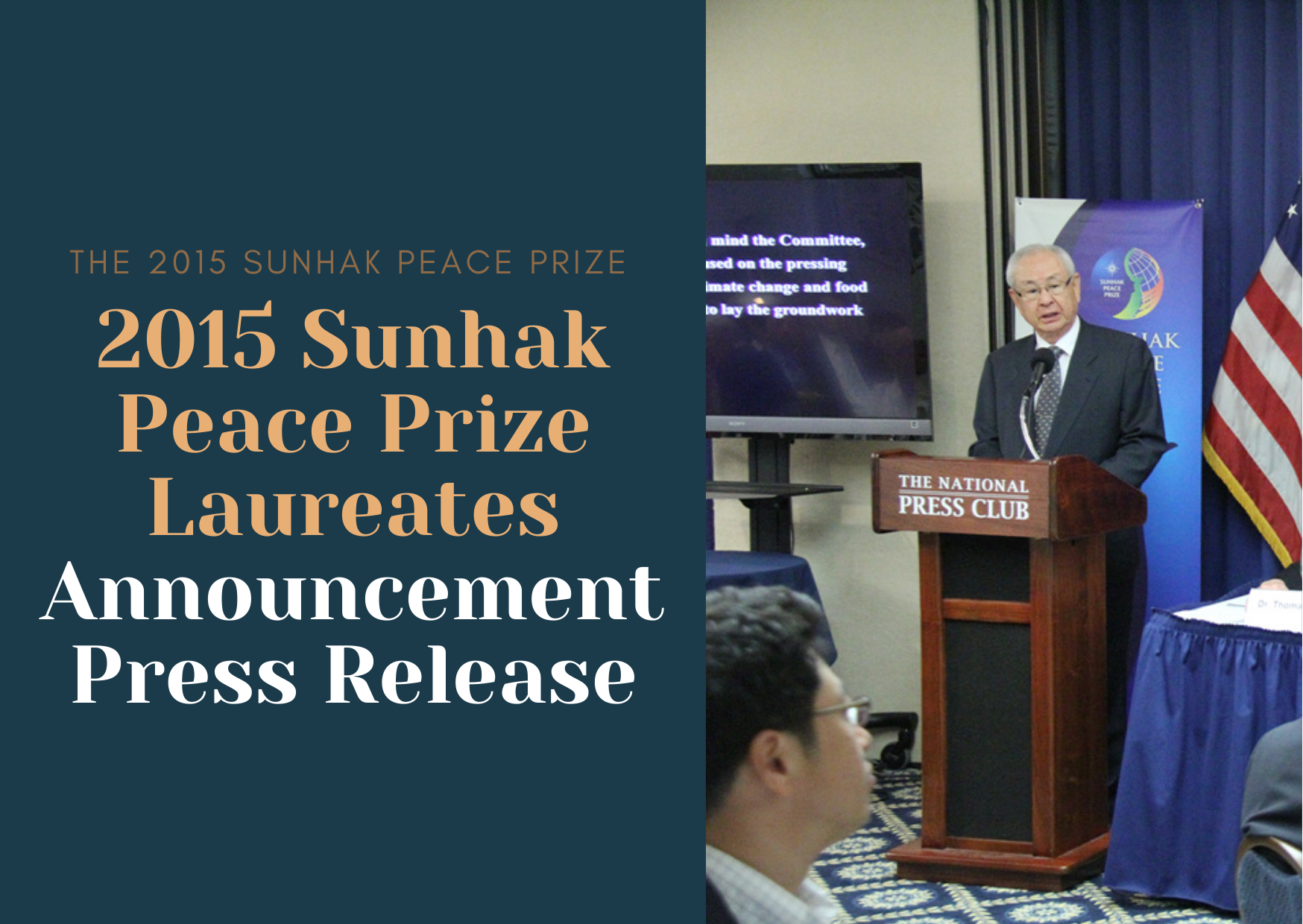
Inaugural Sunhak Peace Prize Awarded To Renowned Sustainable Development Advocates (06082015)
Inaugural Sunhak Peace Prize Awarded to Renowned Sustainable Development AdvocatesWinners are: Dr. M. Vijay Gupta, pioneer of aquaculture to feed rural poor;President Anote Tong of Kiribati, champion of rising sea level awarenessWASHINGTON D.C., June 8, 2015 – Indian fisheries scientist Dr. M. Vijay Gupta and President Anote Tong of the South Pacific island nation of Kiribati have been selected to receive the inaugural Sunhak Peace Prize, a prestigious award given annually to individuals and/or organizations that contribute to global peace through their commitment to environmental sustainability and innovative solutions to conflict-causing crises.The two awardees will be honored at a ceremony in Seoul, South Korea, on August 28, 2015. Each will receive the Sunhak Peace Prize medal, certificate and a cash prize of $500,000.The Sunhak Peace Prize encourages the following:o Peace and human developmento Conflict resolutiono Ecological conservationThe 2015 Prize celebrates and seeks to promote the link between sustainable development practices and global peace and justice. In the 20th century, peace was threatened by world wars and regional conflicts. The threats to peace and human security in this century prominently include not only territorial disputes and the rise of extremism, but also climate change and its impact on food security and clean water for the world’s most vulnerable citizens. The Prize emphasizes the critical role of interfaith and international cooperation based on respect for human rights as an essential foundation for peace.Dr. Gupta is a renowned researcher from India who spent his career creating innovative ways to feed the rural poor by developing and disseminating techniques for low-cost fish farming. For his achievements, Dr. Gupta won the 2005 World Food Prize. He served as the assistant director general at WorldFish, an international fisheries institute located in Malaysia.President Tong’s Kiribati is a collection of 34 atolls and islands 2,500 miles south of Hawaii. Half of Kiribati’s 103,000 citizens live on Tarawa Atoll, which has an average elevation of less than seven feet above sea level. Studies show that the ocean is rising around Kiribati at the rate of three millimeters a year, more than twice the global average. President Tong has drawn international attention and respect for his tireless warnings about the danger of rising seas that results from climate change. His nation could be uninhabitable by the 2050s. “We are honored to announce that the first Sunhak Peace Prize will be presented to these two deserving individuals,” said Il-Sik Hong, former president of Korea University and chairman of the Sunhak Peace Prize Committee. “Dr. Gupta and President Tong are worthy Laureates because they have made the world a better and more peaceful place. Hunger, poverty and climate change lead to global conflict and human suffering, and both men have devoted their lives to furthering peace by finding sustainable solutions to these pressing problems.”Dr. Gupta is an Indian fisheries scientist known as an architect of the “Blue Revolution” – or the productive use of ocean resources – and has been a leader in teaching the rural poor how to fish sustainably. His aquaculture methods have dramatically reduced hunger in Southeast Asia and have empowered rural women with low social status.President Tong, in an effort to preserve his nation and its threatened way of life, has designated 408,250 square kilometers of his country’s waters as a “marine protected area.” To prevent his people from becoming climate change refugees, he has instituted vocational training for a “mass migration with dignity” plan. Nurses and technicians have begun to resettle in Australia and New Zealand. President Tong bought 2,000 hectares of land in Fiji last year and is considering relocating his population.
-
- 2,076
-
- 2 March 2021
- Sunhak Peace Prize
-
Future generations refer not only to our own physical descendants
but also to all future generations to come.Since all decisions made by the current generation will either positively
or negatively affect them, we must take responsibility for our actions.

